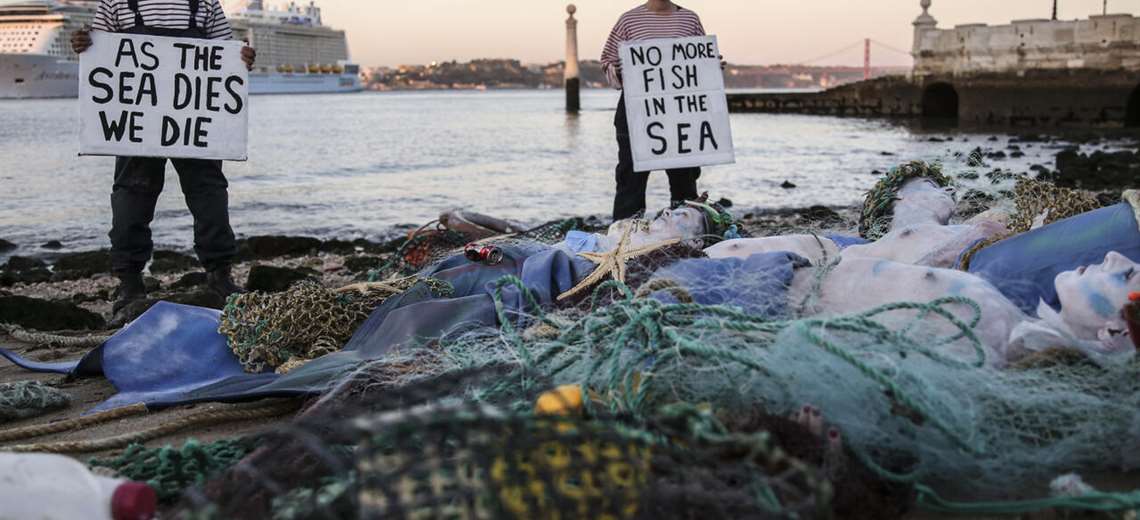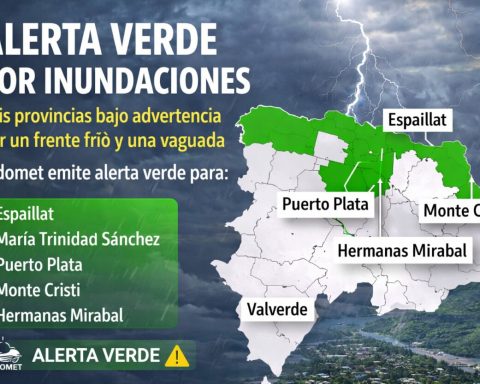The world is facing an “emergency” in the oceans that threat to nature and humanityUN Secretary-General Antonio Guterres said Monday at the start of a major UN conference on the issue in Lisbon.
“Today we are facing what I would describe as an emergency in the oceans,” Guterres told thousands of senior officials, experts and environmental advocates, describing how the oceans have been damaged by climate change and pollution.
Humanity depends on the health of the oceans and 50% of the oxygen that humanity breathes is generated in the sea.
In addition, marine life provides essential proteins and nutrients that feed billions of people every day.
However, since the oceans cover 70% of the earth’s surface, have cushioned the impact of climate change for life on earth, with a significant associated cost.
Ocean acidification caused by CO2 and marine heat waves, which can last for several months, continue to kill coral reefs, on which a quarter of life in the sea and some 250 million people depend.
“Havoc”
“We are just beginning to understand the extent to which climate change going to wreak havoc on the health of the oceans,” said Charlotte de Fontaubert, World Bank official, who heads a division focused on the Blue Economy, a term that seeks sustainable exploitation of the sea.
To make matters worse, there a torrent of pollution, equivalent to the content of a garbage truck per minute, that floods the waters, estimated the UN Environment program.
At current rates, plastic pollution will triple by 2060 and currently microplastics cause the death of one million seabirds every year and 100,000 mammals.
Conference participants will discuss solutions ranging from recycling to a complete ban on plastic bags.
Another key theme of the conference organized jointly by Portugal and Kenya is that of overfishing.
“At least a third of the number of wild fish is overfished and less than 10% of the ocean is protected,” Kathryn Mathews, scientific director of the US NGO Oceana, told AFP.
“Illegal fishing boats sweep away with impunity, both in coastal waters and on the high seas,” he stresses.
Protect the seabed
Discussions will also address a possible moratorium to protect the seabed from mining which searches for rare metals to make batteries for the burgeoning electric vehicle industry.
A coalition that brings together nearly a hundred countries promotes a lighthouse measure that declares protection zones that cover 30% of the planet’s oceans and land.
New leitmotif, “blue food” must make the oceans a means of subsistence that is both sustainable and equitable.
Many ministers and some heads of state will participate in the meeting in Lisbon, which does not, however, have the mission of serving as a session of formal negotiations.
In any case, some participants will take the opportunity to defend an ambitious policy for the oceans with a view to two crucial summits to be held towards the end of the year.
One of them is the UN climate conference COP27 in November in Egypt. The other is the long-awaited UN biodiversity conference COP15, which will finally be held in Canada and not in China.
The world is facing an “emergency” in the oceans that threat to nature and humanityUN Secretary-General Antonio Guterres said Monday at the start of a major UN conference on the issue in Lisbon.
“Today we are facing what I would describe as an emergency in the oceans,” Guterres told thousands of senior officials, experts and environmental advocates, describing how the oceans have been damaged by climate change and pollution.
Humanity depends on the health of the oceans and 50% of the oxygen that humanity breathes is generated in the sea.
In addition, marine life provides essential proteins and nutrients that feed billions of people every day.
However, since the oceans cover 70% of the earth’s surface, have cushioned the impact of climate change for life on earth, with a significant associated cost.
Ocean acidification caused by CO2 and marine heat waves, which can last for several months, continue to kill coral reefs, on which a quarter of life in the sea and some 250 million people depend.
“Havoc”
“We are just beginning to understand the extent to which climate change going to wreak havoc on the health of the oceans,” said Charlotte de Fontaubert, World Bank official, who heads a division focused on the Blue Economy, a term that seeks sustainable exploitation of the sea.
To make matters worse, there a torrent of pollution, equivalent to the content of a garbage truck per minute, that floods the waters, estimated the UN Environment program.
At current rates, plastic pollution will triple by 2060 and currently microplastics cause the death of one million seabirds every year and 100,000 mammals.
Conference participants will discuss solutions ranging from recycling to a complete ban on plastic bags.
Another key theme of the conference organized jointly by Portugal and Kenya is that of overfishing.
“At least a third of the number of wild fish is overfished and less than 10% of the ocean is protected,” Kathryn Mathews, scientific director of the US NGO Oceana, told AFP.
“Illegal fishing boats sweep away with impunity, both in coastal waters and on the high seas,” he stresses.
Protect the seabed
Discussions will also address a possible moratorium to protect the seabed from mining which searches for rare metals to make batteries for the burgeoning electric vehicle industry.
A coalition that brings together nearly a hundred countries promotes a lighthouse measure that declares protection zones that cover 30% of the planet’s oceans and land.
New leitmotif, “blue food” must make the oceans a means of subsistence that is both sustainable and equitable.
Many ministers and some heads of state will participate in the meeting in Lisbon, which does not, however, have the mission of serving as a session of formal negotiations.
In any case, some participants will take the opportunity to defend an ambitious policy for the oceans with a view to two crucial summits to be held towards the end of the year.
One of them is the UN climate conference COP27 in November in Egypt. The other is the long-awaited UN biodiversity conference COP15, which will finally be held in Canada and not in China.
;


















